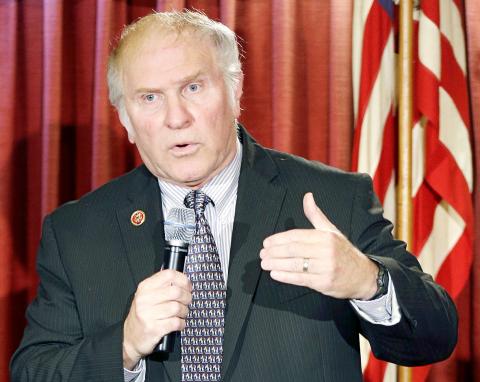Members of the US House of Representatives on Thursday introduced a draft Taiwan travel act that seeks to lift restrictions and allow all high-level officials of Taiwan, including the president, to visit Washington.
The bill, introduced by US representatives Steve Chabot, Brad Sherman and Ted Poe, states that “it should be the policy of the United States to encourage visits between the United States and Taiwan at all levels.”
“Over the past decades, United States-Taiwan relations have suffered from a lack of communication due to the self-imposed restrictions that the United States maintains on high-level visits with Taiwan,” the text of the bill says.

Photo: AP
The proposal advocates a policy of allowing all high-level Taiwanese officials to enter Washington or US embassies and consulates under conditions that demonstrate respect for such leaders.
The US should also allow high-level Taiwanese and US officials to meet in executive departments in the US, including the US Department of State and the US Department of Defense, according to the bill.
It should also allow Taiwan’s representative offices to conduct official business activities, including those involving US lawmakers and government representatives without obstruction from the US government or any foreign power, according to the bill.

Photo: AFP
In a statement, Peter Chen (陳正義), president of the Washington-based Formosan Association for Public Affairs, called the introduction and timing of the act “significant.”
“With the new administration in place in Taiwan, the time is now for the US to enable Taiwan’s president [among others] to come to Washington without restrictions,” said Chen, whose organization is active in promoting Taiwanese independence.
“Why do we let the unelected leaders of China come to D.C. and give them the red carpet treatment at the White House with a 21-gun salute, while we shun the democratically elected leaders of long-time ally Taiwan?” he asked.
Beijing considers Taiwan to be part of its territory and opposes any behavior that could suggest Taiwan is a sovereign nation, including visits by senior officials to nations with which Taiwan does not have formal diplomatic relations.
Presidents of Taiwan have made unofficial “transit” stops in the US on their way to allied nations in Central and South America, but even those have steered clear of Washington.
The most recent visit by a senior Taiwanese official to Washington was by then-minister of economic affairs John Deng (鄧振中) in February last year, the first such trip by an official in his position in 11 years. Trips by other Cabinet-level ministers are also extremely rare.
The bill has to be passed by both the US Senate and the US House of Representatives, and signed by the US president before it becomes law. The president can veto the bill.
In response to the bill, the Ministry of Foreign Affairs in Taipei said it was grateful and welcomed the bill proposed by the representatives, adding that the two nations have close ties and good communications and will continue to deepen their relations.

US President Donald Trump yesterday announced sweeping "reciprocal tariffs" on US trading partners, including a 32 percent tax on goods from Taiwan that is set to take effect on Wednesday. At a Rose Garden event, Trump declared a 10 percent baseline tax on imports from all countries, with the White House saying it would take effect on Saturday. Countries with larger trade surpluses with the US would face higher duties beginning on Wednesday, including Taiwan (32 percent), China (34 percent), Japan (24 percent), South Korea (25 percent), Vietnam (46 percent) and Thailand (36 percent). Canada and Mexico, the two largest US trading

AIR SUPPORT: The Ministry of National Defense thanked the US for the delivery, adding that it was an indicator of the White House’s commitment to the Taiwan Relations Act Deputy Minister of National Defense Po Horng-huei (柏鴻輝) and Representative to the US Alexander Yui on Friday attended a delivery ceremony for the first of Taiwan’s long-awaited 66 F-16C/D Block 70 jets at a Lockheed Martin Corp factory in Greenville, South Carolina. “We are so proud to be the global home of the F-16 and to support Taiwan’s air defense capabilities,” US Representative William Timmons wrote on X, alongside a photograph of Taiwanese and US officials at the event. The F-16C/D Block 70 jets Taiwan ordered have the same capabilities as aircraft that had been upgraded to F-16Vs. The batch of Lockheed Martin

GRIDLOCK: The National Fire Agency’s Special Search and Rescue team is on standby to travel to the countries to help out with the rescue effort A powerful earthquake rocked Myanmar and neighboring Thailand yesterday, killing at least three people in Bangkok and burying dozens when a high-rise building under construction collapsed. Footage shared on social media from Myanmar’s second-largest city showed widespread destruction, raising fears that many were trapped under the rubble or killed. The magnitude 7.7 earthquake, with an epicenter near Mandalay in Myanmar, struck at midday and was followed by a strong magnitude 6.4 aftershock. The extent of death, injury and destruction — especially in Myanmar, which is embroiled in a civil war and where information is tightly controlled at the best of times —

China's military today said it began joint army, navy and rocket force exercises around Taiwan to "serve as a stern warning and powerful deterrent against Taiwanese independence," calling President William Lai (賴清德) a "parasite." The exercises come after Lai called Beijing a "foreign hostile force" last month. More than 10 Chinese military ships approached close to Taiwan's 24 nautical mile (44.4km) contiguous zone this morning and Taiwan sent its own warships to respond, two senior Taiwanese officials said. Taiwan has not yet detected any live fire by the Chinese military so far, one of the officials said. The drills took place after US Secretary